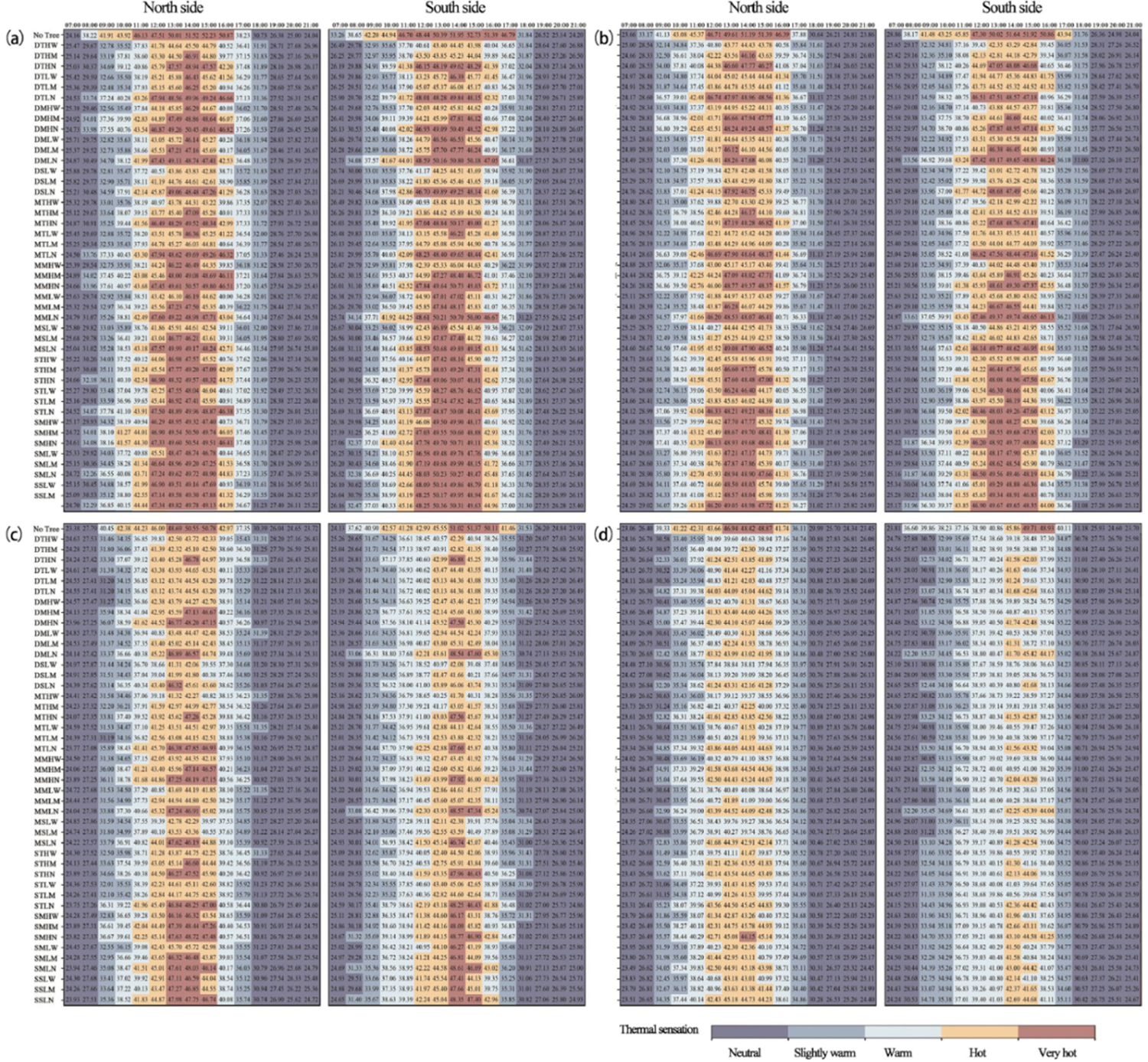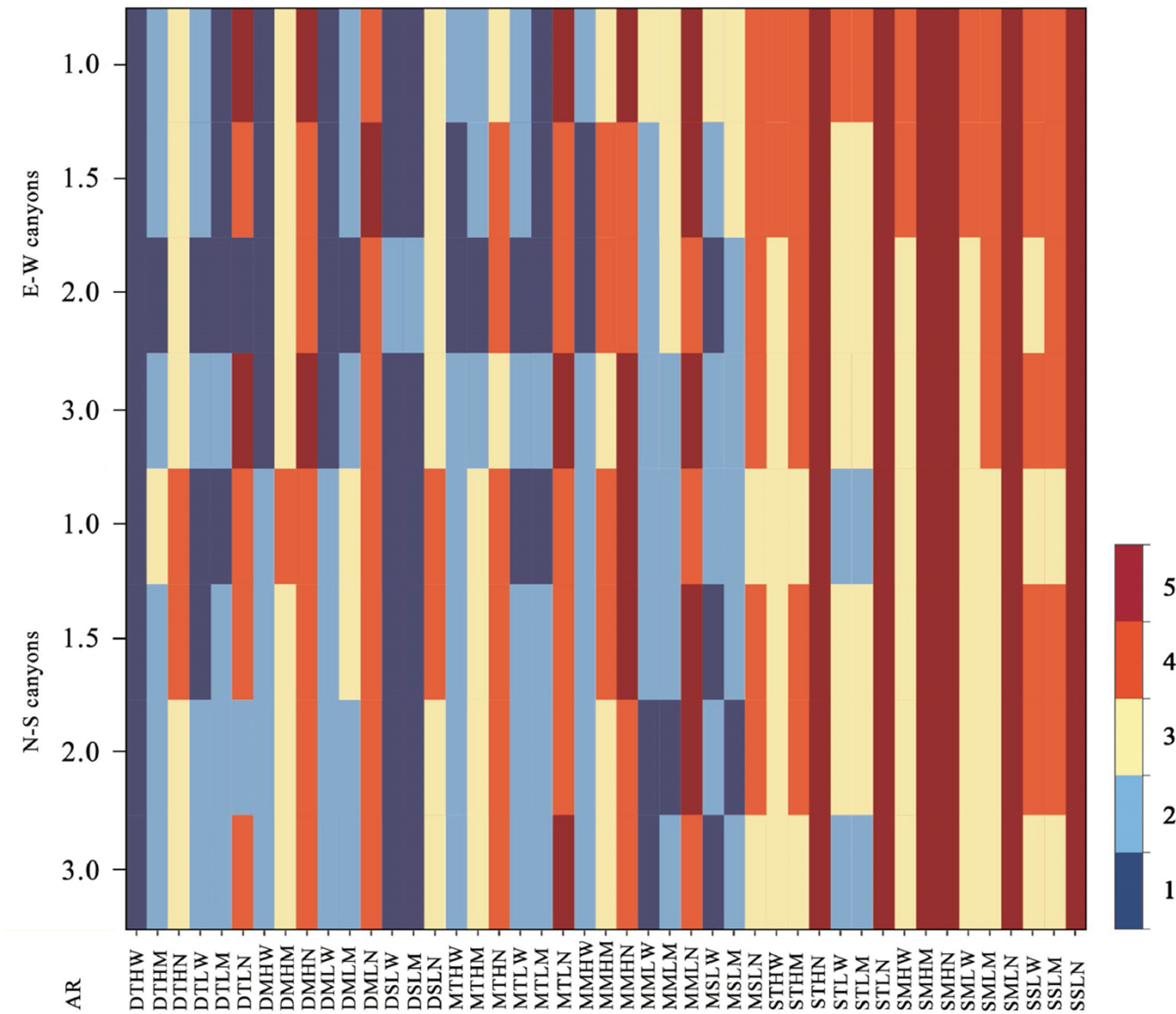南湖新闻网讯(通讯员 肖乾坤)近日,我校园艺林学学院风景园林系城市生态健康诊断与蓝绿空间效能优化创新团队吴昌广副教授课题组在绿色可持续发展技术领域学术期刊Sustainable Cities and Society上发表了题为“Tree form characteristics as criteria for tree species selection to improve pedestrian thermal comfort in street canyons: Case study of a humid subtropical city”的研究论文,系统解析了行道树树形特征与街谷几何结构耦合对环境热舒适性的动态影响,为城市街谷绿化缓解行人热暴露风险提供了新的科学依据和实践指导。
行道树种植是改善城市街谷小气候和提升行人热舒适性的重要策略,厘清不同类型街谷中行道树树形特征与环境热舒适性的关联机制对选择行道树树种具有重要意义。研究针对“行道树树形-街谷几何结构-行人热感觉”耦合效应,构建了行道树调控环境热舒适的综合评估框架,通过引入考虑时间动态变化的室外热舒适加权指数(Weighted Outdoor Thermal Comfort Autonomy, OTCAw),量化评估不同树形特征对各类街谷的热舒适改善潜力以及叶面积密度(Leaf area density, LAD)、冠幅(Crown diameter, CD)、树高(Tree height, HT)、分枝点高度(Trunk height, TH)四个树木形态因子的贡献度,进而识别改善行人热舒适性的行道树树形与街谷类型最佳组合模式。

图1 街谷行道树种植ENVI-met模型(a)及示意图(b),45种树木形态模型(c)
研究团队以武汉为案例城市,在对行道树形态特征调查基础上构建了45种具有代表性的树木形态,并结合4种不同街谷高宽比(H/W=1.0、1.5、2.0、3.0)和2种街谷走向(东西、南北),生成了184个树木形态特征与街谷几何形态组合方案。采用城市微气候模拟软件ENVI-met,模拟预测了夏季典型高温日不同情景方案下街谷行人水平生理等效温度(Physiological equivalent temperature, PET)在早7点至晚9点的逐时动态变化特征。并基于上述综合评估框架,量化不同树木形态因子对街谷环境热舒适的权衡与协同关系,提出了最优的树木形态组合,以及相应的修剪策略和种植优先级,以适应武汉市不同类型街谷环境热舒适改善需求。该项研究提供了一个实用的气候适应性设计方法,辅助设计师更有效地选择和种植行道树以优化城市街谷的热环境。

图2 行道树形态特征与街谷高宽比组合模式下东西向街谷两侧行人热舒适性逐时变化(a) H/W = 1.0, (b) H/W = 1.5, (c) H/W = 2.0, (d) H/W = 3.0

图3 不同形态行道树种植条件下八类街谷人行道室外热舒适加权指数聚类
该研究得到了国家自然科学基金、中央高校基本科研业务费、武汉市园林和林业局科技计划等项目资助。风景园林系博士研究生肖乾坤为论文第一作者,硕士研究生樊萱、郭雅耘为共同作者,吴昌广副教授为论文通讯作者,武汉市园林科学研究院和武汉市林业工作站参与了研究工作。
【英文摘要】
The combined effect of tree characteristics on heat stress in different street canyons has been widely reported. However, there remains a lack of effective methods for improving pedestrian thermal comfort through the use of integrated knowledge of tree characteristics. Here, a tree species selection approach was developed for assessing the dynamic effects of tree forms and canyon geometries on pedestrian thermal comfort to address the issue of the right tree in the right street canyon. The leaf area density (LAD), crown diameter (CD), tree height (HT), and trunk height (TH) were used as criteria for determining tree species characteristics, and the weighted outdoor thermal comfort autonomy (OTCAw) was adopted as a quantitative index of thermal comfort variation over time. In a case study of Wuhan, China, we evaluated the thermal comfort enhancement potential of 45 tree forms in street canyons with varying aspect ratios and orientations from 7:00 to 21:00 by using a validated ENVI-met model. Accordingly, tree pruning strategies and 19 optimal tree forms were proposed for corresponding street canyons. Our study provides insight into the optimal street tree species for minimizing heat exposure of pedestrians under various urban canyon configurations.
审核人:吴昌广